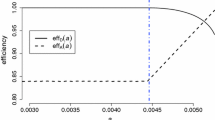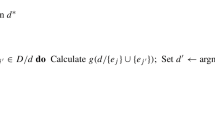Abstract
Optimal exact designs are problematic to find and study because there is no unified theory for determining them and studying their properties. Each has its own challenges and when a method exists to confirm the design optimality, it is invariably applicable to the particular problem only. We propose a systematic approach to construct optimal exact designs by incorporating the Cholesky decomposition of the Fisher Information Matrix in a Mixed Integer Nonlinear Programming formulation. As examples, we apply the methodology to find D- and A-optimal exact designs for linear and nonlinear models using global or local optimizers. Our examples include design problems with constraints on the locations or the number of replicates at the optimal design points.

Similar content being viewed by others
References
Atkinson, A., Donev, A.: The construction of exact \(D\)-optimum experimental designs with application to blocking response surface designs. Biometrika 76(3), 515–526 (1989)
Atkinson, A., Donev, A., Tobias, R.: Optimum Experimental Designs, with SAS. Oxford University Press, Oxford (2007)
Berman, S.: An extension of the arc sine law. Ann. Math. Stat. 33(2), 681–684 (1962)
Boer, E., Hendrix, E.: Global optimization problems in optimal design of experiments in regression models. J. Glob. Optim. 18, 385–398 (2000)
Box, G., Hunter, W.: The experimental study of physical mechanisms. Technometrics 7(1), 23–42 (1965)
Chang, F.C., Imhof, L., Sun, Y.Y.: Exact \(D\)-optimal designs for first-order trigonometric regression models on a partial circle. Metrika Int. J. Theor. Appl. Stat. 76(6), 857–872 (2013)
Chang, F.C., Yeh, Y.R.: Exact \(A\)-optimal designs for quadratic regression. Stat. Sin. 8, 527–534 (1998)
Chernoff, H.: Locally optimal designs for estimating parameters. Ann. Math. Stat. 24, 586–602 (1953)
Coale, A., McNeil, D.: The distribution by age of the frequency of first marriage in a female cohort. J. Am. Stat. Assoc. 67(340), 743–749 (1972)
Cook, R., Nachtsheim, C.: Comparison of algorithms for constructing \(D\)-optimal design. Technometrics 22(3), 315–324 (1980)
Donev, A.: Crossover designs with correlated observations. J. Biopharm. Stat. 8(2), 249–262 (1998). PMID: 9598421
Drud, A.: CONOPT: a GRG code for large sparse dynamic nonlinear optimization problems. Math. Program. 31, 153–191 (1985)
Du Croz, J., Higham, N.: Stability of methods for matrix inversion. IMA J. Numer. Anal. 12, 1–19 (1992)
Duarte, B., Wong, W.: Finding Bayesian optimal designs for nonlinear models: a semidefinite programming-based approach. Int. Stat. Rev. 83(2), 239–262 (2015)
Duarte, B., Wong, W., Atkinson, A.: A semi-infinite programming based algorithm for determining \(T\)-optimum designs for model discrimination. J. Multivar. Anal. 135, 11–24 (2015)
Duarte, B., Wong, W., Dette, H.: Adaptive grid semidefinite programming for finding optimal designs. Stat. Comput. 28(2), 441–460 (2018)
Duran, M., Grossmann, I.: An outer-approximation algorithm for a class of mixed-integer nonlinear programs. Math. Program. 36(3), 307–339 (1986)
Esteban-Bravo, M., Leszkiewicz, A., Vidal-Sanz, J.: Exact optimal experimental designs with constraints. Stat. Comput. 27(3), 845–863 (2017)
Fedorov, V.: Theory of Optimal Experiments. Academic Press, New York (1972)
Fedorov, V., Leonov, S.: Optimal Design for Nonlinear Response Models. Chapman and Hall/CRC Press, Boca Raton (2014)
Fletcher, R., Leyffer, S.: Numerical experience with lower bounds for MIQP branch-and-bound. SIAM J. Optim. 8(2), 604–616 (1998)
Floudas, C.: Mixed-integer nonlinear optimization. In: Pardalos, P., Resende, M. (eds.) Handbook of Applied Optimization, pp. 451–475. Oxford University Press, Oxford (2002)
Gaffke, N.: On \(D\)-optimality of exact linear regression designs with minimum support. J. Stat. Plan. Inference 15, 189–204 (1987)
GAMS Development Corporation: GAMS—a user’s guide, GAMS release 24.2.1. GAMS Development Corporation, Washington, DC, USA (2013a)
GAMS Development Corporation: GAMS—the solver manuals, GAMS release 24.2.1. GAMS Development Corporation, Washington, DC, USA (2013b)
Golub, G.H., van Loan, C.F.: Matrix Computations, 4th edn. JHU Press, Baltimore (2013)
Goos, P., Donev, A.: Blocking response surface designs. Comput. Stat. Data Anal. 51(2), 1075–1088 (2006)
Goos, P., Vandebroek, M.: \(D\)-optimal response surface designs in the presence of random block effects. Comput. Stat. Data Anal. 37(4), 433–453 (2001)
Goos, P., Vandebroek, M.: \(D\)-optimal split-plot designs with given numbers and sizes of whole plots. Technometrics 45(3), 235–245 (2003)
Gotwalt, C., Jones, B., Steinberg, D.: Fast computation of designs robust to parameter uncertainty for nonlinear settings. Technometrics 51(1), 88–95 (2009)
Gribik, P., Kortanek, K.: Equivalence theorems and cutting plane algorithms for a class of experimental design problems. SIAM J. Appl. Math. 32, 232–259 (1977)
Harman, R., Filová, L.: Computing efficient exact designs of experiments using integer quadratic programming. Comput. Stat. Data Anal. 71, 1159–1167 (2014)
Harman, R., Jurík, T.: Computing \(c\)-optimal experimental designs using the simplex method of linear programming. Comput. Stat. Data Anal. 53(2), 247–254 (2008)
Hill, A.: The possible effects of the aggregation of the molecules of haemoglobin on its dissociation curves. J. Physiol. 40(Suppl.), 4–7 (1910)
Imhof, L.: \(A\)-optimum exact designs for quadratic regression. J. Math. Anal. Appl. 228, 157–165 (1998)
Imhof, L., Lopez-Fidalgo, J., Wong, W.K.: Efficiencies of rounded optimal approximate designs for small samples. Stat. Neerlandica 55(3), 301–318 (2001)
Johnson, M., Nachtsheim, C.: Some guidelines for constructing exact \(D\)-optimal designs on convex design spaces. Technometrics 25, 271–277 (1983)
Kiefer, J.: General equivalence theory for optimum design (approximate theory). Ann. Stat. 2, 849–879 (1974)
Laird, A.: Dynamics of tumor growth. Br. J. Cancer 18(3), 490–502 (1964)
Lastusilta, T., Bussieck, M., Westerlund, T.: Comparison of some high-performance MINLP solvers. Chem. Eng. Trans. 11, 125–130 (2007)
Leszkiewicz, A.: Three essays on conjoint analysis: optimal design and estimation of endogenous consideration sets. Ph.D. thesis, Universidad Carlos III de Madrid (2014)
López-Fidalgo, J., Tommasi, C., Trandafir, P.: Optimal designs for discriminating between some extensions of the Michaelis–Menten model. J. Stat. Plan. Inference 138(12), 3797–3804 (2008)
Mandal, A., Wong, W.K., Yu, Y.: Algorithmic searches for optimal designs. In: Dean, A., Morris, M., Stufken, J., Bingham, D. (eds.) Handbook of Design and Analysis of Experiments, pp. 755–786. CRC Press, Boca Ratton (2015)
Meyer, R., Nachtsheim, C.: The coordinate-exchange algorithm for constructing exact optimal experimental designs. Technometrics 37, 60–69 (1995)
Mitchell, T.: An algorithm for the construction of \(D\)-optimal experimental designs. Technometrics 20, 203–210 (1974)
Mitchell, T., Miller Jr., F.: Use of Design Repair to Construct Designs for Special Linear Models. Technical Report, pp. 130–131, Oak Ridge National Laboratory (1970)
Molchanov, I., Zuyev, S.: Steepest descent algorithm in a space of measures. Stat. Comput. 12, 115–123 (2002)
Nuñez Ares, J., Goos, P.: An integer linear programming approach to find trend-robust run orders of experimental designs. J. Qual. Technol. 51(1), 37–50 (2019). https://doi.org/10.1080/00224065.2018.1545496
Palhazi Cuervo, D., Goos, P., Sörensen, K.: Optimal design of large-scale screening experiments: a critical look at the coordinate-exchange algorithm. Stat. Comput. 26(1), 15–28 (2016)
Pantelides, C.: The consistent initialization of differential-algebraic systems. SIAM J. Sci. Stat. Comput. 9(2), 213–231 (1988)
Pukelsheim, F.: Optimal Design of Experiments. SIAM, Philadelphia (1993)
Rasch, D., Hendrix, E., Boer, E.: Replication-free optimal designs in regression analysis. Comput. Stat. 12, 19–52 (1997)
Sagnol, G.: Computing optimal designs of multiresponse experiments reduces to second-order cone programming. J. Stat. Plan. Inference 141(5), 1684–1708 (2011)
Sagnol, G., Harman, R.: Computing exact \(D\)-optimal designs by mixed integer second order cone programming. Ann. Stat. 43(5), 2198–2224 (2015)
Sahinidis, N.: BARON 14.3.1: global optimization of mixed-integer nonlinear programs, user’s manual. The Optimization Firm, LLC, Pittsburgh (2014)
Sartono, B., Goos, P., Schoen, E.: Constructing general orthogonal fractional factorial split-plot designs. Technometrics 57(4), 488–502 (2015a)
Sartono, B., Schoen, E., Goos, P.: Blocking orthogonal designs with mixed integer linear programming. Technometrics 57(3), 428–439 (2015b)
SAS Institute Inc.: \(\text{JMP}^{\textregistered }\) 13 User Guide, 2nd edn. SAS Institute Inc, Cary (2017)
Tawarlamani, M., Sahinidis, N.: Convexification and Global Optimization in Continuous and Mixed Integer Nonlinear Programming, 1st edn. Kluwer Academic Publishers, Dordrecht (2002)
Vandenberghe, L., Boyd, S.: Applications of semidefinite programming. Appl. Numer. Math. 29, 283–299 (1999)
Vo-Thanh, N., Jans, R., Schoen, E., Goos, P.: Symmetry breaking in mixed integer linear programming formulations for blocking two-level orthogonal experimental designs. Comput. Oper. Res. 97, 96–110 (2018)
Welch, W.: Branch-and-bound search for experimental designs based on \(D\)-optimality and other criteria. Technometrics 24(1), 41–48 (1982)
Westerlund, T., Pettersson, F.: An extended cutting plane method for solving convex MINLP problems. Comput. Chem. Eng. 19, 131–136 (1995)
Wynn, H.: The sequential generation of \(D\)-optimum experimental designs. Ann. Math. Stat. 41(5), 1655–1664 (1970)
Yang, J., Mandal, A., Majumdar, D.: Optimal design for two-level factorial experiments with binary response. Stat. Sin. 22(2), 885–907 (2012)
Yang, J., Mandal, A., Majumdar, D.: Optimal designs for \(2^k\) factorial experiments with binary response. Stat. Sin. 26, 381–411 (2016)
Acknowledgements
The research of Wong is partially supported by a grant from the National Institute of General Medical Sciences of the National Institutes of Health under Award Number R01GM107639. The content is solely the responsibility of the authors and does not necessarily represent the official views of the National Institutes of Health. The authors acknowledge two anonymous reviewers that contributed undoubtedly to improve the quality of the paper.
Author information
Authors and Affiliations
Corresponding author
Additional information
Publisher's Note
Springer Nature remains neutral with regard to jurisdictional claims in published maps and institutional affiliations.
Electronic supplementary material
Below is the link to the electronic supplementary material.
Rights and permissions
About this article
Cite this article
Duarte, B.P.M., Granjo, J.F.O. & Wong, W.K. Optimal exact designs of experiments via Mixed Integer Nonlinear Programming. Stat Comput 30, 93–112 (2020). https://doi.org/10.1007/s11222-019-09867-z
Received:
Accepted:
Published:
Issue Date:
DOI: https://doi.org/10.1007/s11222-019-09867-z
Keywords
- Model-based optimal designs
- Exact designs
- Constrained designs
- Mixed Integer Nonlinear Programming
- Global Optimization




